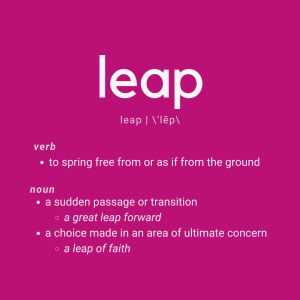Ever notice that books about how managers can learn to give performance feedback focus on really difficult conversations first? It seems like a completely awful place to begin. Sort of like wanting to lose a few pounds and starting your training by being chased by a pack of wild dogs every morning to make sure you do your cardio. While it’s possible that you could start there, there are other options.
I’ll agree that starting with the difficult stuff is sometimes necessary, especially if there is an unexpected crisis and you’re brand new to a situation. But being able to handle difficult and unexpected conversations starts with practicing the normal, basic interactions that make your work easier. Every conversation can have its twists and turns, and getting good at communicating when the situation isn’t stressful builds your skill and agility. This “practice the basics” idea can sound dull, but go with me here for a minute.
Think of someone on your team to whom you have to give performance feedback, and answer these 3 questions:
- Can you list the basic steps of a good, feedback-related conversation?
- Do you know the purpose and goal for each step and how to make the most of them so that your feedback is used?
- In hours, how much time have you spent in the last month avoiding giving someone feedback?
We don’t often ask these questions and we should. We don’t ask them of each other because we don’t want to offend. We assume smart people know how to talk to other smart people. And that’s where the problem starts.
In your career, did someone deliberately mentor you on how to have a good conversation with another person? Not a, “here’s what you have to say so we complete all of our annual reviews” or a “here’s what not to say so we don’t get sued” conversation, but a practical chat that helps get the daily stuff done. And not just done, but done without drama, confusion, or fear of the unexpected. If you had such a mentor, you are lucky.
We don’t generally get asked the question, “So, how comfortable are you with having clear, open, sometimes directive, goal and process-driven conversations on a daily basis?” We also don’t respond, “Well, actually, I feel a bit awkward and giving performance feedback makes me breakout in hives, so I tend avoid it whenever I can. Any advice?”
By the time we make it to management, we are expected to know how to do this. And if we are in a specialty field that required us being in school for years, we are supposed to have magically gotten this training between thesis writing or studying for the bar or doing a surgical residency. “Well, you’re smart. You’ll figure it out” is the all too common, unhelpful reply.
Which is why we end up back at the difficult conversations. We aren’t aware that the basic skills of daily conversation, of regular feedback, of clarity and confidence in agreements are the things that help us prevent difficult conversations. We didn’t know we could get good at the completely dull basics and make our work easier.
The great news is that it’s never too late to get really good at it. Then we have fewer and fewer difficult conversations. We have fewer of them because we’ve had them when they were easy – because we know how.
What would you do with all the time and energy you’d save having easy conversations? Maybe a little cardio – minus the wild dogs.
Want to know the 4 basic steps to stress-free feedback? Click HERE and get the free download of my Conversation Blueprint. Make managing easier.





